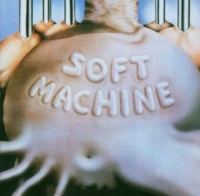
By this point in Soft Machine’s history, drummer/vocalist Robert Wyatt was long gone and the Dadaist art pop of the first two LPs had vanished in a thick cloud of jazz-fusion smoke. But it would be a mistake to ignore Soft Machine’s post-Wyatt output. While many praise Third as the group’s peak after sweet Bobby W. left, I’m partial to Six—and it’s mainly because of two epic tracks: “The Soft Weed Factor” (John Barth allusion noted) and “Chloe And The Pirates.” I’ll explain why shortly. But first, it’s important to say that Six consists of one live LP and one studio record. The latter is where the best tracks lie.
Don’t get me wrong—the 11 live songs here are quite good. Whenever you have musicians the caliber of Hugh Hopper (bass), Mike Ratledge (keyboards, celeste), John Marshall (drums, percussion), and former Nucleus member Karl Jenkins (oboe, saxes, pianos), you’re going to get smart, complex, timbrally interesting compositions. Ratledge and Jenkins dominate the songwriting, and their PhD-level prog and jazz chops keep your neurons on their proverbial toes (clunky metaphor alert), as you try to figure out their crazy time signatures. The highlight of the concert recordings may be “Lefty,” which sounds like Miles Davis in At Filmore/Live-Evil/Big Fun mode—surprising and explosive.
Now about those two standouts mentioned in the first paragraph. Jenkins’ 11-minute “Soft Weed Factor” is a patiently unspooling piece featuring Jenkins and Ratledge’s intertwining keyboards, a helix of slow-motion, Terry Riley-esque hypnosis. When the methodical funk beats, sinuous bass line, and sax come in, it sounds like Miles and his In A Silent Way band have infiltrated the studio. Chills ensue. It would be okay if this were three times longer. Ratledge’s “Chloe And The Pirates” begins with a spacey electric-piano-dominated fantasia not unlike the intro to Deodato’s “Thus Sprach Zarathustra (2001)” before gradually shifting into a showcase for Jenkins’ beautiful oboe arabesques. He kind of puts Andy Mackay’s part in Roxy Music’s “Ladytron” to shame. Six ends on a very weird note, with Hopper’s “1983” evoking a spinal-fluid-chilling horror-soundtrack vibe with chthonic piano and percussion whose spooked-wind-chime timbres I’ve never heard anywhere else. (If they haven’t already, Demdike Stare really should sample this.) Here’s to world-class studio trickery… -Buckley Mayfield


